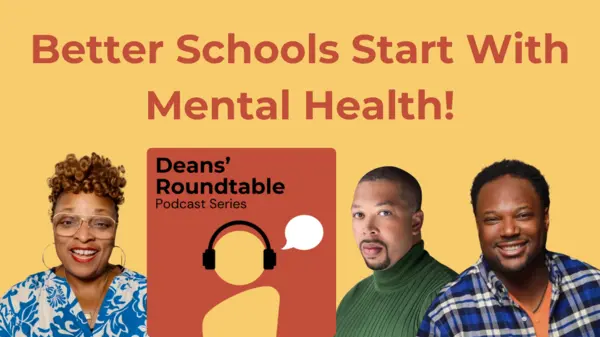Mental Health in Leadership: Creating Safe Spaces for Authentic Conversations

In today's fast-paced world, mental health challenges and personal struggles often remain hidden beneath professional facades. As leaders in education and beyond, understanding and addressing these invisible battles is crucial for creating supportive, productive environments. A recent Dean's Roundtable podcast episode featuring award-winning actor and producer Malachi Rivers and licensed therapist Dr. George James explored this vital intersection of personal challenges and professional responsibilities.
The Hidden Weight of Personal Struggles
Every day, people carry invisible burdens into their workplaces, classrooms, and communities. From financial pressures to family responsibilities, these challenges shape how individuals show up and interact with others.
"People try to keep up a front... they come across all smiling, like, 'Hey, I'm good,' you know?" - Malachi Rivers
This tendency to mask our struggles can create barriers to authentic connection and effective leadership. Dr. James emphasizes that "we are complex, layered, beautiful people that sometimes don't even know all the different influences that are impacting us."
Creating Psychological Safety in Professional Spaces
One key insight from the conversation centered on the importance of psychological safety. In both educational and creative environments, leaders must intentionally craft spaces where people feel secure enough to be vulnerable and authentic.
Dr. James explains, "Whoever's creating the environment, whoever's leading the environment, it is on them to create a psychologically safe space, a space where people can be open, can be productive, can be creative."
Practical Strategies for Building Psychological Safety:
- Practicing active empathy and genuine curiosity about others' experiences
- Creating opportunities for honest dialogue without judgment
- Modeling vulnerability and authenticity as a leader
- Establishing clear boundaries while maintaining warmth
- Regularly checking in with team members beyond surface-level interactions
The Role of Mental Health Awareness
Educational leaders face unique challenges in supporting mental health awareness. Dr. James emphasizes the importance of self-care for educators: "There's something that for many leaders and especially school administrators that they're not often practicing self-care and renewal."
"All those limits that you feel you don't have to have them, and practicing good mental health can help you push those limits away." - Dr. James
Moving Forward
As we continue navigating complex professional landscapes, it's crucial to remember that everyone carries their own invisible battles. By creating spaces that acknowledge and support these struggles, we can build stronger, more resilient communities.
Remember, the goal isn't to eliminate struggles but to create environments where people feel safe acknowledging them and seeking support when needed. Through intentional leadership and genuine empathy, we can build communities that support both professional excellence and personal well-being.
About the Author
Bridget Johnson is an Executive Leadership Coach & Educational Community Builder, and the Founder of Deans' Roundtable. She is dedicated to transforming organizations through strategic development & inclusive leadership.
Bridget Johnson
Want more support as a student life professional?
Look no further than the Deans' Roundtable Community
- Network with a vast directory of student life professionals like yourself
- Gain a multitude of professional development opportunities to be the best version of yourself
- Gather expert advice on the important questions you need answered

